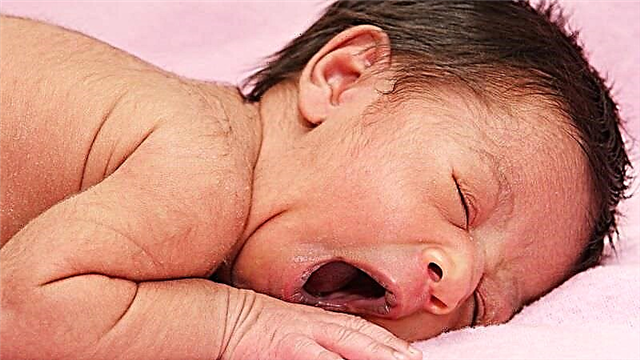
If a woman is expecting a baby, she should be doubly attentive to her own health. But sometimes it is impossible to avoid colds and viral infections, so you have to consult a doctor and use medications that are approved for pregnant women. One of them is Pinosol. Preparations with this name are not contraindicated while carrying a baby, but should be used only after consulting a doctor.

Features of the drug
Pinosol is sold over the counter in pharmacies in three different versions. The most popular form of medication is drops.... They are transparent, greenish-blue in color, and have a pleasant smell of eucalyptus and menthol. This liquid is poured into 10 ml glass vials with rubber pipettes. The average price of one bottle is 150 rubles. You need to store the drug at home at room temperature for no longer than 3 years from the date of manufacture.
The second liquid form of "Pinosol" is a spray... It is also available in bottles containing 10 ml of medicine, but the liquid inside is transparent and has a peculiar smell. This oily solution is usually colorless, but may have a slight yellowness. Its main advantage is called ease of use, since due to the presence of a dispenser on the bottle, the product is easily sprayed and evenly covers the nasopharyngeal mucosa. Such a spray costs about 230 rubles, and its shelf life is 2 years. Storage of such "Pinosol" in the refrigerator is not required.
The third form of medication is nasal ointment.... It is produced in aluminum tubes and is characterized by a high concentration of active ingredients. This type of "Pinosol" is especially convenient to use at night. One tube contains 10 g of a transparent white aromatic substance. The average price of such a product is 270 rubles, the shelf life is 2 years from the date of issue indicated on the package.

Composition and action
The action of drops, ointment and spray provides several active substances at once. Common to all forms of "Pinosol" are thymol, pine oil, eucalyptus oil and tocopherol. The drops contain two more active ingredients - guazulene and peppermint oil. The spray additionally includes only peppermint oil, and the ointment contains menthol. Auxiliary components in different types of "Pinosol" differ, their list is indicated on the package.
The active compounds in the composition of the drug have anti-inflammatory properties and the ability to reduce the swelling of the mucous membrane. In addition, the ingredients of Pinosol have some antimicrobial and antiseptic effects. In particular, the drugs help get rid of E. coli, candida, staphylococci and streptococci.
Due to the use of ointments and liquid forms, the secretion that is secreted in the nose is liquefied, and the swelling of the mucous membrane is eliminated. The drugs help to reduce the inflammatory process, prevent infection with catarrhal forms, and also accelerate tissue healing if the inflammation is chronic.

Is it allowed during pregnancy?
As already mentioned, all the products of the Pinosol line are considered safe for the fetus, so they can be used by expectant mothers without fear. The use of such drugs early in the course of the disease helps to stop the development of the infection and avoid antibiotic treatment. Also it is very important to deal with a runny nose and stuffy nose during pregnancy, because if nasal breathing is disturbed, less oxygen will flow into the lungs of a woman... Accordingly, the baby will also receive less of this vital element, which can affect his general condition and development.
"Pinosol" can be prescribed to women in a position even in the 1st trimester, when the baby's organs are just beginning to be laid and it is undesirable to use many other medicines. The ingredients of drops, ointments and spray do not harm embryonic development in any way, are unable to cause a threat of miscarriage and cause other complications. These funds are also allowed for women in the 2nd and 3rd trimester, they help to get rid of accidentally caught rhinitis and acute respiratory infections. In the last stages, "Pinosol" can be used until the very birth, making it easier for the woman to breathe and reducing the risk of hypoxia for the fetus.
But, despite the safety and naturalness of "Pinosol", it is advisable to resort to such drugs only in extreme cases, when other measures have been ineffective... In case of colds and runny nose, the expectant mother should pay maximum attention to the quality of the air in the room in which she stays. With dryness and high temperatures, it will be harmful to the nasopharyngeal mucosa. The result will be excessive dryness and a stuffy feeling in the nose.
This can be avoided by frequent ventilation and humidification. In addition, pregnant women can irrigate and rinse the nasal passages with normal saline or seawater-based products.
And if humidification, ventilation and flushing turned out to be ineffective, then you will have to resort to drugs, choosing the safest one, which is Pinosol.

When is it prescribed for expectant mothers?
The most common reason for using Pinosol during pregnancy is acute rhinitis or acute rhinopharyngitis. The drugs are also in demand in chronic forms of the common cold, especially if there is atrophy of the mucous membrane. "Pinosol" is also prescribed in other situations when the nasopharynx is dry, for example, if the patient has undergone some kind of manipulation on the nasal passages.
Contraindications
The use of "Pinosol" is not recommended for hypersensitivity to any active or auxiliary ingredients. Ointment, spray and drops are also not prescribed for allergic rhinitis. Treatment of this form of rhinitis requires the use of special agents that will help reduce the reaction to the allergen, so Pinosol will be ineffective.

Side effects
Any of the varieties of "Pinosol" can provoke a negative local reaction, which is indicated in the instructions, for example, redness, burning sensation or severe itching in the nasopharynx.
If such symptoms appear after one or more applications of the drug, further treatment should be abandoned immediately. There is no data on the incompatibility of "Pinosol" with any other drugs.
How to apply?
Depending on the dosage form of "Pinosol", the drug is used as follows.
- The agent in drops is injected into the nasal passages in a few drops... The frequency of instillation is determined by the doctor, but, as a rule, with active inflammation, the treatment is carried out every hour, and as the symptoms subside, you need to drip Pinosol less and less. The duration of treatment with drops is usually 5-7 days. As soon as the manifestations of the disease pass, the medication is canceled.
- The drops can also be used for inhalation... The advisability of such treatment during pregnancy is determined by a specialist. If he sees the need for inhalation therapy, then the procedure is carried out 2-3 times a day, using 2 ml of solution for one inhalation.
- "Pinosol" in the form of a spray is injected in turn into each nostril, one dose... The doctor takes into account the severity of the inflammation and determines how often the medication should be sprayed. Processing can be carried out 3 to 6 times a day. To inject, you need to remove the cap, press the dispenser with your fingers, and then reinstall the cap. The duration of application of the spray is up to 10 days.
- Application of the ointment is performed 3-4 times during the day... The drug is used to lubricate the anterior sections of the nasal passages, using cotton swabs, after which they lightly press the wings of the nose with fingers so that Pinosol is evenly distributed. This form of medicine can be used for up to two weeks, but more precisely the number of days during which the ointment is used is determined by a specialist.


Reviews
On the use of "Pinosol" while waiting for the child, they leave mostly positive reviews. In them, these drugs are praised for their effectiveness, calling their main advantages a mild effect on the mucous membrane, herbal ingredients and safety for the fetus. Among the advantages of "Pinosol" are also noted the variety of forms, due to which the medicine is selected individually, taking into account the symptoms and sensitivity of the patient.
According to expectant mothers, thanks to the treatment with "Pinosol" dryness in the nose and next to it is eliminated, and the runny nose passes faster. However, severe congestion is removed with difficulty with such means, and in some patients, the ointment and solution caused an allergic reaction. In addition, there are complaints of too strong odor, itching in the nose, sore throat and other negative symptoms, due to which "Pinosol" had to be replaced with another local remedy.
Analogs
If for any reason the use of "Pinosol" is impossible, the doctor will recommend a similar drug.
- "Cameton"... The composition of such an antiseptic spray includes camphor and eucalyptus oil, as well as levomenthol and chlorobutanol. These substances relieve pain, reduce inflammation, and improve blood flow in the nose. The drug can be prescribed to pregnant women if they have no intolerance to its ingredients.
- "Miramistin"... Such a solution is capable of destroying bacteria and some viruses. It is allowed during the waiting period for the baby at any time, since it does not harm the development of the child's body. With rhinitis, it is dripped into the nose up to 8 times a day, and in case of complications, inhalation is prescribed.
- "Aqua Maris Strong"... The action of such a nasal spray is due to a hypertonic solution of sea water. There are no preservatives in the preparation and it is completely safe for pregnant women. The agent effectively reduces edema due to different osmotic pressures, and also helps fight bacteria and enhances local immunity.



